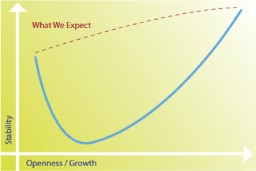Words of Wellness

June 26, 2015 | The Rev. Dr. Scott Stoner
Change: Planned and Unplanned
Change tends to come in one of two ways-planned or unplanned. It is a given that unplanned changes will be stressful. A job loss, an unexpected health diagnosis, an accident, the sudden death of a friend or loved one or the sudden end to a relationship are of course some of the most stressful events any of us can encounter in our lives. No one ever plans or chooses such events, which of course only adds to the stress created by these types of changes.
What is perhaps not as well understood is that even changes that are planned, those that are chosen for very positive reasons and are happily anticipated, can also be very stressful. Beginning a new romantic relationship, starting a new job, moving to a new community, adding a baby to the family, retiring, adding new staff to an organization, beginning a school year, or joining the military are all changes, while planned and chosen, can come with their own fair share of stress.
We at Living Compass are currently in the midst of many planned changes, which are not without their share of stress. You may have already noticed one of our changes, as this week's column features an updated look for our logo. In addition to a new look, we are in the midst of a major expansion of our wellness resources for adults, teens, parents, and families. We are extremely excited about the changes that we are making at Living Compass and grateful that they are needed as they are being made in response to the tremendous growth we have experienced in requests for our resources and programs. Nevertheless, there is still stress as we change and grow with the addition of new staff and new programs.
Allow me to introduce the "J" Curve, the single most helpful concept in explaining why change, both planned and unplanned, creates stress. The "J" Curve, pictured above, has a vertical axis showing "Stability" and a horizontal axis showing "Openness/Growth." The dotted line shows the trajectory we would like to see when positive change is planned and freely chosen. We expect that such change will put us on a path where each day we will feel better than the day before. While we may expect positive, planned change to follow this path, the reality is that all change, even positive change, initially creates a period of instability. This is shown perfectly by the "J" Curve as it illustrates that the initial movement toward openness and growth is accompanied by an initial decrease in stability.
In the Book of Exodus, found in the Old Testament, we read a story of a group of people who find themselves in the midst of a "J" Curve. Moses is leading his followers on an exodus out of years of bondage under a dictator in Egypt, an exodus -a change- that the people choose and are initially excited to be making. The journey to freedom takes Moses and his followers through the wilderness of a "J" Curve. Eventually their excitement wanes and the people get frustrated that the journey is not the path that they had expected. At one point, when they are discouraged and are losing hope, they announce that they want to turn back to the the life they had so much wanted to escape. They were at the bottom of their "J" Curve and they wanted to go back. They wanted to go back to the stability, the status quo of their previous bondage, because they perceived it to be more stable and familiar, better than the struggle they were currently experiencing. As the story goes, they resist the urge to go back and forge ahead with new determination and eventually experience the promise of a new life. They lived through the worst of the "J" Curve process, came up the other side, and were then able to enjoy the benefits of their hard work and determination.
Living Compass is in the midst of a "J" Curve. Perhaps you are, too. Maybe your "J" Curve is one that has been planned, or maybe it was not. Either way, it is helpful to know that all change initially creates instability and yet in order to experience growth, we must be willing to persevere through the times of stress that naturally come with change. Such perseverance is greatly aided by the support of others and by the support of one's hope and knowledge that such times of stress and change are not signs that things are falling apart, but rather are signs that things are coming together in a new and different way. This very understanding can help us develop the patience and perspective needed to move through the challenging times of transition, planned and unplanned, that we all face.
Subscribe Now to Weekly Words of Wellness
Donít wait another day! Enter your e-mail address below to signup for the e-mail version of Weekly Words of Wellness. Rev. Dr. Scott Stoner covers a new topic each week providing insight and wisdom for our everyday lives.
You can unsubscribe at any time.

